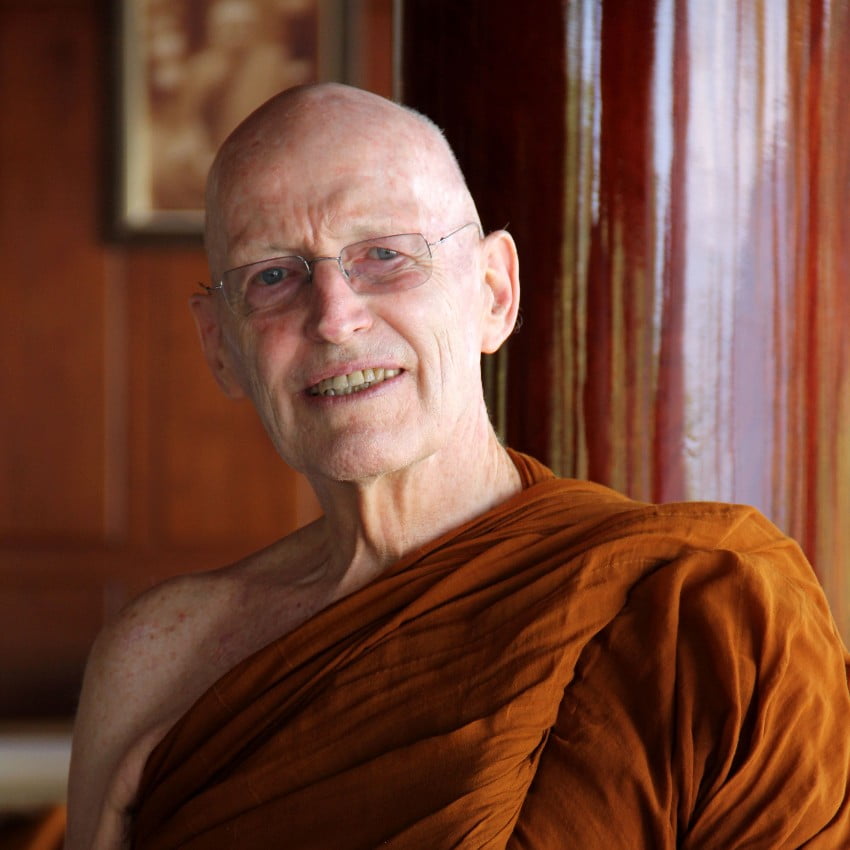Well, I think you’re doing it at this center. It is a special place. Thai people are open, they want to know. I’ve seen significant change in the many years I’ve been connected to Thailand, especially in the middle class. People aren’t content with just old traditional Buddhism. There is this very pure tradition, it’s very strong in Thailand. Buddhism does tend to get bogged down in ceremonies and traditional forms – not to put that down, because that kind of preserves the religion itself – but now is a time when Thai people, I think, are ready to develop more on the paṭipadā level, practice level. And for that they need encouragement because, sometimes, meditation is presented like it’s too hard. I hear it all the time both from Thais and Western people about how difficult meditation is. They don’t have time, and maybe they’ve been practicing a long time and the result isn’t very good, or they’ve got too many emotional problems and things like this, so there are all kinds of believable excuses. But that’s because they don’t understand what meditation really is about. It oftentimes is presented as you got to really give up everything and shut yourself away in a cage until you’re enlightened. That’s one way of looking at it, but for modern people in a city like this, they can’t do that. The Buddha’s teaching is not about arranging conditions so that they don’t irritate you, it’s about awakening to the present moment.
Thai people in Bangkok have a lot of practice in patience, such as driving a car in the morning traffic jams, things like that. You shouldn’t see that as an obstruction to meditation but as an opportunity. To observe – not to seek peace and calm – just observe the tendency to be frustrated when you can’t move or if you are stuck for a long time and you have an important appointment. Things like this. You can observe this obsessive, anxious impatience in modern life. In the more rural areas – the old rice-growing communities in Isaan – they used to be very patient because they lived by the seasons, when rice was growing and when it wasn’t, and when there was harvesting. They had a lovely cultural quality, but that time is gone.
Now you’ve got modern technology, and people are educated and have information, but then there are traffic jams and pollution and environmental problems. Everything is building up into worries and fears and whatnot. So it’s important to realize that with the Buddhist teachings you’re actually observing in yourself how you’re worried about the future, or you’re angry because the car in front of you won’t move. You’re not trying to get rid of the anger, but just to develop a sense of awareness that anger arises and ceases. It’s nonjudgmental. It isn’t like you say: “Oh, I get angry too easily” and making it into a personal problem, but just notice the way it is, that whatever you’re experiencing right now is changing. If you just let it be what it is, it will naturally flow and end.
And so people begin to realize that it isn’t asking the impossible, or that you have to be a specially refined person or a gifted person to be able to do it. Just learn to get the right attitude and learn how to trust yourself more, not on a personal ego level, but from observing how things are. When we do that, then we find our own personal problems fade out. But if you don’t know that, then your own personal problems can just become obsessive forms of anxiety and fear over sometimes nothing at all, like what the neighbor thinks of me – one can make up a whole scenario of paranoia just by grabbing hold of that one.
First published on BIA social media in August 2020 on the occasion of the 10th anniversary of the Buddhadāsa Indapañño Archives (www.facebook/suanmokkh.bkk & www.bia.or.th/en)
More articles by Ajahn Sumedho
Mental Enema
Ajahn Sumedho
In this winter’s retreat, the month of January has passed and a new month begins in the silence, the cold weather, the stillness of winter. Whether the retreat is organized for us to be meditating as a group or alone,... Meer lezen
The Way It Is
Ajahn Sumedho
This is the half-moon Observance Day, and we have the opportunity to reflect on Dhamma, the way it is. For each one of us, the way it is right now is going to be different: with our own moods, memories,... Meer lezen
Reflections on mettā
Ajahn Sumedho, Ajahn Sucitto, Ajahn Amaro, Ajahn Jayasaro
The Practice of Mettā by Luang Por Sumedho There is a great lack of mettā in the world today because we have overdeveloped our critical faculties: we constantly analyze and criticize. We dwell on what is wrong with ourselves,... Meer lezen
Dhamma Reflections – Doom, Destruction, Death, Decay
Ajahn Sumedho
Doom, Destruction, Death, Decay This journey is involved with pain, with loss, as well as with pleasure and with gain. This realm isn’t a realm that we create out of our fantasy life; this realm is the way it... Meer lezen
Remembering Tan Ajahn Buddhadāsa
Ajahn Sumedho
I’ve always regarded Ajahn Buddhadāsa, along with Luang Por Chah, as one of my primary teachers. I could relate to their way of teaching because it was so direct and simple. Ajahn Chah wasn’t intellectual at all – he hardly... Meer lezen
